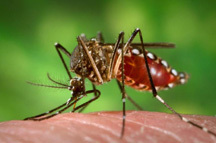
The American Association for the Advancement of Science on Thursday (May 17) published the first draft of the genome sequence of the Aedes aegypti mosquito species that transmits the yellow fever and dengue parasite to humans. Research by University of Notre Dame biologist David W. Severson formed an integral part of the project.
The genome is the complete set of genetic material, including genes and other segments of DNA, in an organism.
Frank Collins, George and Winifred Clark Professor of Biology at Notre Dame, was the principal investigator of an international consortium of researchers that in 2002 mapped the genome of Anopheles gambiae , the primary mosquito species that transmits the malaria parasite to humans. Severson also participated in that sequencing.
The two mosquitoes diverged in evolution roughly 150 million years ago.
The Aedes aegypti mosquito spreads 200,000 cases of yellow fever annually, which cause 30,000 deaths, 95 percent occurring in Africa.
The mosquito also spreads an estimated 100 million cases of dengue fever each year. Dengue fever usually starts with a high fever and chills and may include headaches, backache and muscle and joint pain. Dengue hemorrhagic fever is a potentially deadly disease characterized by a high fever and may be accompanied by loss of appetite, nausea, vomiting, abdominal pain and nose or gum bleeding.
Dengue virus occurs most often is South East Asia, Africa and Central America because Aedes mosquitoes do not survive well in cold climates.
The idea of wiping out whole mosquito populations with insecticides proved unworkable because mosquitoes evolved and became resistant to the chemicals.
As an alternative, Notre Dame scientists have been researching the development of genetically engineered mosquitoes that would be incapable of transmitting disease.
For example, biologist Malcolm Fraser is attempting to develop a new approach to suppress the replication of dengue virus within Aedes mosquitoes, using genetic engineering to introduce a molecular mechanism that can harness the virusown genetic molecule to activate a cell death pathway that kills infected cells. Thisdeath upon infectionstrategy would provide immunity against dengue in transgenic mosquitoes. Coupling the immunity with a selectable gene would allow the immune mosquitoes to compete with native mosquitoes, effectively reducing the number of infected mosquitoes and thus limiting the capability of Aedes to transmit disease.
The Aedes genome sequence led by Severson and Vishvanath Nene of the Institute of Genomic Research (TIGR) could lead to a variety of different research approaches to control mosquitoes and the pathogens they transmit to humans.
The late George Craig, an internationally known medical entomologist and Notre Dames Clark Professor of Biology, established a world-renowned research program in mosquito biology and genetics at the University. Its Center for Global Health and Infectious Diseases is an internationally recognized research group whose interests center around both animal parasites and the arthropod vectors of human pathogens, along with the pathogens they transmit and the human responses to infection.
Contact: David W. Severson, professor of biological sciences, 574-631-3826, severson.1@nd.edu
TopicID: 22946